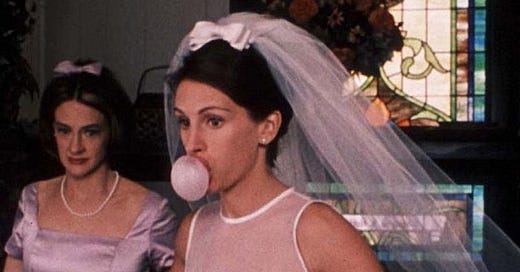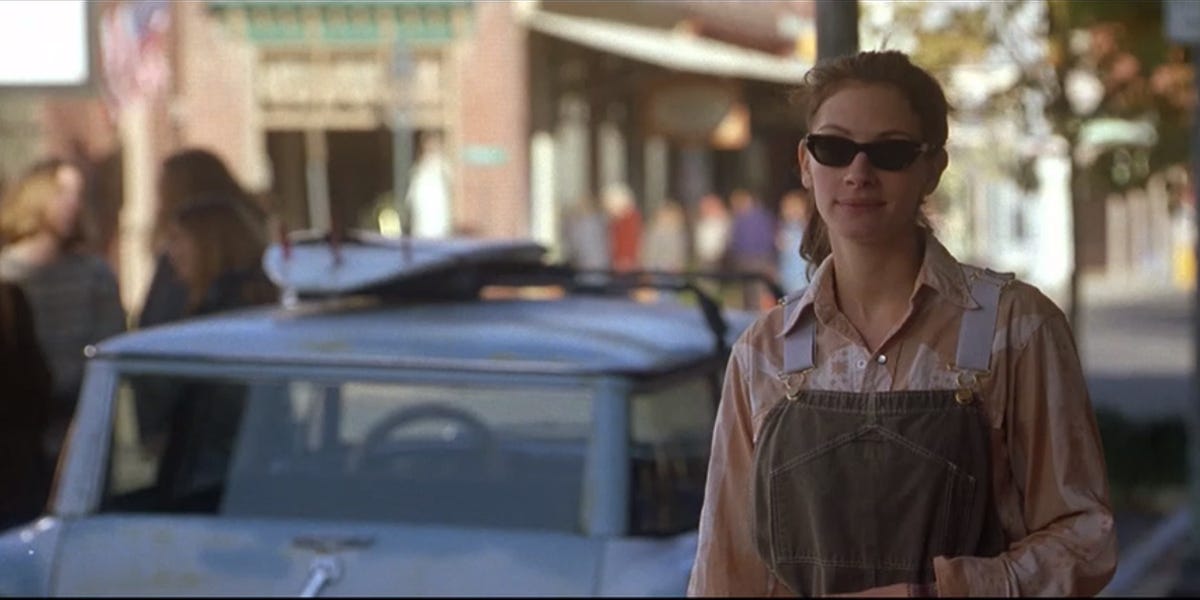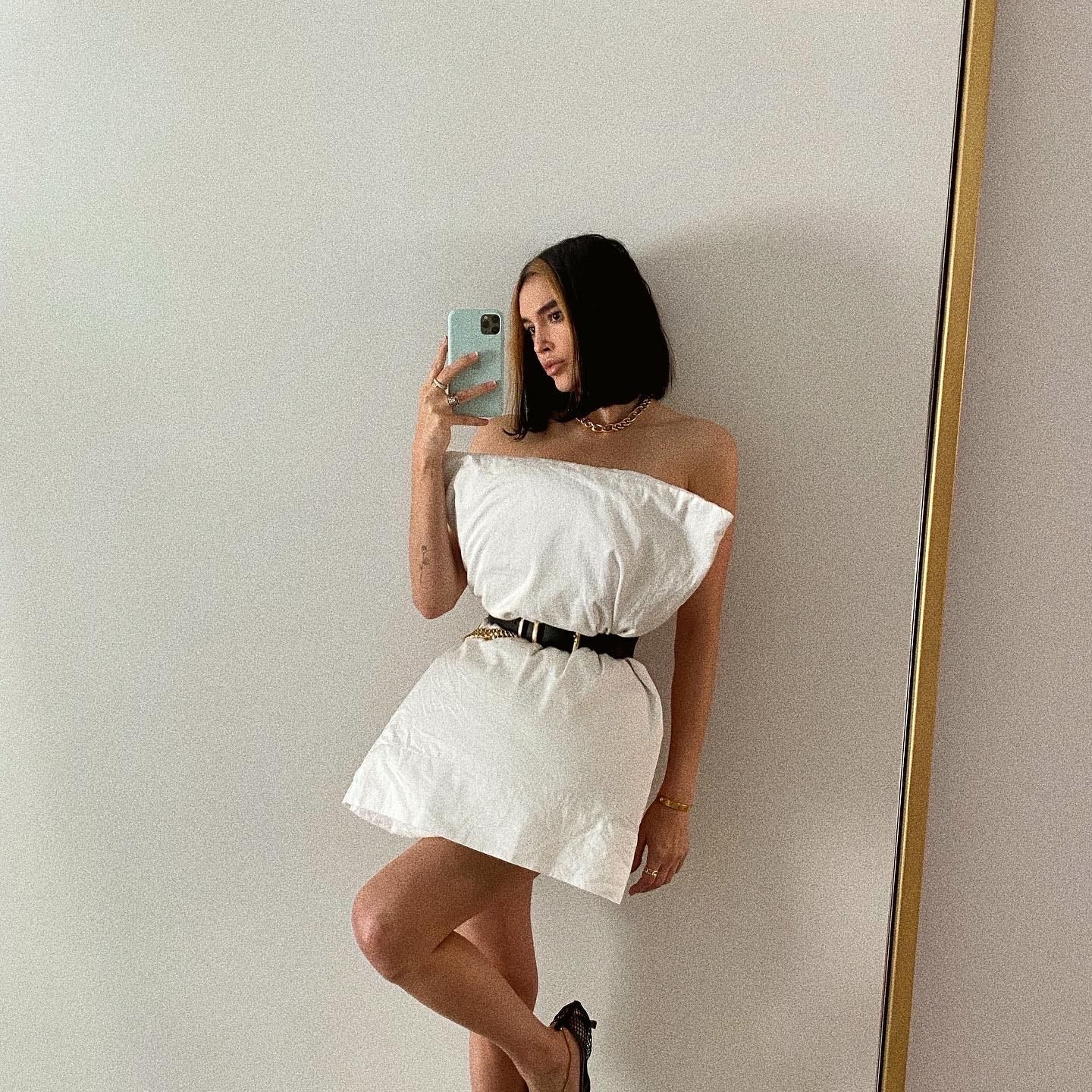The death of mystery on Instagram
Some thoughts on effortlessness and the 'Gram. And Runaway Bride.
The hit 1999 rom-com, Runaway Bride is about a lot of things. Love. Doubt. Knowing yourself. Monogamy. Social pressures. But it also touches on the stereotype, phenomenon, or trope that we know to be “the cool quirky girl”. More specifically, it can be seen through a dialogue exchange that always stuck with me. It occurs between the main character, Maggie Carpenter, played by Julia Roberts and her best friend Debbie, played by Joann Cusack.
In the scene, Maggie is coming to terms with the fact that she gives off, what Debbie calls “flirtatious energy” that exudes from her so much that it sometimes “…attaches itself to any male that moves,” referring to an earlier scene where Roberts was innocently, yet over-excitingly high-fiving Debbie’s husband at a baseball game.
“But I don’t mean to,” Maggie replies helplessly.
Her friend Debbie knows this. As childhood friends, she’s always known this about her friend. And she knows it’s not because Maggie is a home wrecker or wants to sleep with her husband, instead she describes her friend like this:
“You are like ‘I’m so charming and mysterious in a way that I don’t even understand,” Debbie says. “It’s very hard to compete with. Especially for married women who have lost our mystery.”
Even though the exchange of dialogue was more in the context of romance and relationships, there’s a lot there that can be unpacked. For me it had me pondering about the idea of mystery: how do we get it, how do we keep it and where does it come from? But also a word that was not used in Cusack’s lines but I still think could ring true to that situation: effortlessness.
Maggie Carpenter, the easy-going, hardware shop-owning, overalls-wearing female protagonist in the film, could definitely be described as effortless. Men flock to her. Her magnetizing personality pulls everyone in. Her hair is perfectly disheveled and even though the town she lives in does know the personal details of her love life, people still can’t seem to figure her out. One could argue that her air of mystery revolves around the fact that she’s not yet married, and keeps backing out, leaving herself as this perpetual single woman in town that floats freely.
And if this film was set in 2021 and Maggie Carpenter had an Instagram, she would absolutely have the perfect, cool-girl aesthetic.
What do we really show on Instagram? Our faces, our friends, the clothes and homes we inhabit, the things we like and adore. That hasn’t changed so much — the content — but the way we pose the content has.
The early days of the app could be argued as the most mysterious. You couldn’t really expect what people would be posting because everyone was just experimenting with the whole idea of it: a photo there, a selfie there. Some of the first photos posted on the app included shots of my half-finished pink Vitamin Water, a random photo of of strawberry ear-buds and one too many photos of blurry sunsets. All with the fuzzy “Valencia” filter on it. Even though I posted them, they pose so many questions: What was I thinking? Where was I? Why did I think this was relevant? What message was I trying to send with this weird combination of items? Hence, the mystery. Because my head was absolutely, undoubtably empty when I posted that. To this day, I have no idea. And nevertheless, it was a fairly accurate encapsulation of my
As I got into my late high school and college years, more and more questions started to run through my head before posting: Does this go with my feed? Does it match my aesthetic? Does it go with my color palette? Do I look awkward? Do I need to re-edit it? Do I need to change my feed aesthetic altogether?
Around this time, the app slowly started to grow. Or rather, it swelled, expanded and eventually ballooned into the glossy, analytics-driven, un-chronologically ordered, #ad-filled space that we know it to be today. Once people realized the money they could make, the attention they could get, the life they could create, it got more serious. With creators investing in proper cameras, going out specifically to take photos for their post, investing in grid planning apps to plan out their feeds (an app I still sometimes use myself), organizing and meticulously curating your feed became the norm.
And unsurprisingly, a lot of people got burnt out. Myself included, and I really wouldn’t even categorize myself as an influencer or even someone who relies on Instagram all that much. I’ve done a couple ad posts in the past, sort of dipping my toes into that world, but it wasn’t really the prospect of money or free things that motivated me, rather having a perfect, encapsulated reflection of me.

I remember people asking me back in 2018/2019, “how do you get your feed so perfect?” I had no idea how to answer except simply admitting all the effort I put into it, which ultimately, made me feel a bit queasy. Was the effort I was putting into it matching up with the joy I was getting out of it? The same thing happened when I met with some friends and acquaintances who I thought had the perfect feeds but they too, felt burnt out and empty about it all of a sudden. And then the pressure built up, I got worried about being able to keep it up forever.

So then, in response to this, throughout the last several years, the pendulum swung again. Because even though there’s definitely all kinds of creators out there, you could argue that the “trend” of “trying too hard” for a post has become extremely and unequivocally uncool. And if you don’t see it in culture analysis pieces like these, just take a look at what the next generation of apps are saying as people on TikTok seem to even cringe going on Instagram anymore.
In her 2019 piece for The Atlantic, Taylor Lorenz writes about this shift perfectly:
“While Millennial influencers hauled DSLR cameras to the beach and mastered photo editing to get the perfect shot, the generation younger than they are largely post directly from their mobile phones.”
We went from clean and cut symmetrical posts with real cameras, to now more unassuming, I-woke-up-like posts that look more lived in, less polished. This came certainly from the desire for relatability in posts, instead of picture-perfect moments that no one could ever live up to, since they were so obviously staged. But more importantly, staged or not, I think we all, as users and viewers of social media just wanted to see something earnest behind it.
So the pendulum swung back. And this isn’t a new take, as the article I linked form 2019 suggests. But as more “unfiltered” and “messy” posts have become the norm, it still didn’t really answer the question to me which was; what does it really mean to come off as effortless?
Because as we moved on from symmetrical outfit photos, professional photos of our coffee and feeds with the same color scheme to more casual and quick mirror selfies, the performance aspect and the effort still remained. You can see this through a recent bombshell of information that dropped back in March, which revealed that influencers get the perfect, cleanest mirror selfies because they don’t use mirrors. An article published in The Guardian, hits the nail on the head:
Fake spontaneity where real spontaneity would have been more easily achieved may be a head-scratcher, but Derek Conrad Murray, a theorist in the history of art and visual culture at the University of California, Santa Cruz, doesn’t think the artifice is meant as trickery. “In online cultures today, there is a very self-conscious embrace of artificiality as a value system and aesthetic strategy,” he says.
So, you could say we’ve come full circle. At the end of the day, we're still putting in an effort to look effortless. But why does the mirror paradox really cut that deep? Maybe because, for the longest time since the emergence of mirror selfies, they had this organic quirk to them that although, there was a certain effort put in, they somehow still showed our true selves — usually in the form of stiff poses, a digital Canon camera flashing in the mirror, a carelessness and even sense of chaos that felt more sincere.
Even as we moved into the world of camera phones, mirror selfies always had more of a lounging attitude — a quick snap that usually required maybe a shot or two to get one we liked — but now it’s expanded into way more than that.
Outside of the Instagram sphere, I think people in general have been gravitating more towards the idea of earnestness when we post, on various platforms. A whole movement has been happening towards being wholesome, rather than always putting on a front. Honesty and authenticity is being valued over showmanship, which is good in a lot of ways.
But there’s also nothing wrong with just putting on a show on social media, and admitting it.
I’ve been a little vocal about this recently, but it’s been hard for me to find joy in Instagram anymore, or what it entails. And I think a lot of other people on my feed feel the same exhaustion and confusion around where to go next. It’s interesting because I have a photography account where I post something maybe a couple times a month because the only time I post is when I have a new batch of photos from a photoshoot, so it really does feel natural in every way. I post when I have content, instead of forcing myself to pump out off-the-cuff material from my often un-glamorous life.
And it's funny, because even though all those photos on my photo account are completely staged and polished in every sense of the word -- setting, location, general outfits, posing, lighting, edited in photoshop afterwards -- it feels more authentic posting those images than trying to find a perfect angle that makes me look polished, cute but still in an “I don't care” kind of way for my main account.
Maybe I’m overstepping and assuming that all of us obsess over what we post, or rather, obsess over how we look like when we post. For a while there was a trend where people (usually women) would literally apologize when posting more than once in a day: “Sorry for the double post!”, as if we were terrified of not only taking up space, but for that the way we took up that space was too earnest, too excited, with too much effort.
But I feel a shift happening. Slowly but surely, I think a lot of us are caring less — we’re less embarrassed over taking a #fitpic, we don’t shame ourselves for putting in the effort behind a post. Life is short: it’s time to give up on the myth of effortlessness. The myth of mystery on social media. Because the mystery is dead and always has been — it can’t survive, not fully. Maybe in the early, early days of the app, when we were all earnest, innocently posting weirdly angled photos of sunsets with those god-awful built-in filters, and frames it felt truly raw, even if it didn’t feel like it at the time.
And the real truth is this: as we stray away from more contrived posts and to quick, off-the-cuff selfies and videos, as we stop worrying about posting one single photo every day and move to posting a less-conspicuous photo dumps, we might circle all the way around the Earth and find ourselves back to those ugly built-in filters which will eventually come off as more “vintage” and “laid back” instead of pre-editing on VSCO.
The work it takes to come off as mysterious and effortless on social media, almost never has a good pay off and often causes us to burnt out. It’s impossible to achieve because it’s an oxymoron. So why try to mask it at all? If you want to put effort into a post that you worked hard on to style and put together: do it, show it and stand by it.
At the end of the day, that’s just asking way too much of ourselves, and the small corners of the internet that we inhabit. For everyone around us to know us but also to view us as mysterious is an impossible feat, on the internet at least.
Maybe the secret is keep things to yourself and becoming selective about what part of yourself you’re putting out onto the internet. Maybe instead of picking and choosing how to perform on the internet, we draw the curtains completely once in a while. Maybe we savor some parts — the best parts, even. The parts of yourself that makes someone go, “Huh, I didn’t know that about you.”















